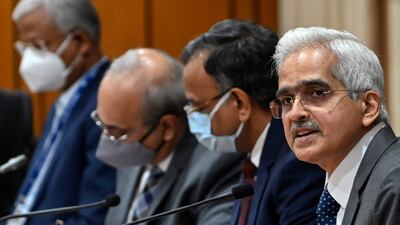India's central bank has raised its benchmark interest rate for the second consecutive month in an effort to tame surging inflation.
“Inflation has steeply increased much beyond the upper tolerance level,” said Reserve Bank of India Governor Shaktikanta Das, as he announced the increase on Wednesday. “A large part of the rise in inflation is primarily attributed to a series of supply shocks linked to the war.”
The RBI's move to raise the repo rate by 50 basis points to 4.9 per cent was widely expected and comes after its surprise rate increase last month as Russia's invasion of Ukraine pushed commodity prices higher globally.
“To knock high inflation out of the park, central banks are having to step out of the crease and come out swinging with tight monetary policy,” said Aurodeep Nandi, an India economist and vice president at Nomura.
The challenge of rising inflation comes at a time when India is still recovering from the economic impact of the Covid-19 pandemic.
Asia's third-largest economy faces fresh headwinds due to the geopolitical situation.
However, the RBI has shifted to a sharper focus on fighting inflation, raising some concerns about the impact of higher interest rates on growth.
“The increase in [the] repo rate is RBI baring its teeth,” said Suman Banerjee, chief investment officer at hedge fund Hedonova. “This is very welcome for the banks but not very good for the broader economy.”
The size of the RBI's rate increase on Wednesday was slightly more than some had expected. But given the current inflationary pressures, economists believe the RBI will deliver further increases in the coming months.
“This was more aggressive than the consensus prediction of [a] 40 basis point hike,” Emirates NBD said in a research note on Wednesday. “We now forecast a further 75 basis points of hikes through the end of the year,”
The Indian rupee, which weakened to record lows last month, was virtually flat at 77.75 during trade on Wednesday, while stocks were stagnant in afternoon trading.
The rise in interest rates “will help to a limited extent in checking the fall in the value of the rupee”, said M Sharma, the chief economist at Indian credit rating agency Infomerics.
“Rate hike means Indian interest rates for fixed-income investors will rise, thereby raising the probability of fresh foreign institutional investor inflows at least in the bond markets, if not equity markets too,” said Vijay Bhambwani, head of research at Equitymaster.
Higher oil prices have exacerbated inflation in India, the world's third-largest consumer of oil.
Retail inflation in April hit an eight-year high of 7.79 per cent in India as a result of higher food and fuel prices, according to the most recent official data available.
This is well above the RBI's target of keeping inflation between 2 per cent and 6 per cent.
Inflation is expected to remain above its upper threshold for the first three quarters of the financial year that started on April 1, as the RBI raised its inflation forecast for the year to 6.7 per cent from 5.7 per cent, Mr Das said.
With further rising rates, some have expressed concerns about the effects on the country's economic growth, as borrowing becomes more expensive.
“Our fear is that growth could see a serious deceleration [in the second half of this financial year and next year] on the back of such steep tightening and structural constraints,” said Nikhil Gupta, the chief economist at Motilal Oswal Financial Services.
Many businesses are still trying to bounce back from the effects of the pandemic.
“From a real estate perspective, this hike in the policy rate comes as a hurdle as home loan rates will increase, putting a dent on the homebuyer's sentiments,” said Ramani Sastri, chairman and managing director of Sterling Developers, an Indian property company based in Bengaluru.
“Any increase in the interest rate will further impact the costs of doing business and hence the move will hurt business sentiment too as the economy is still recovering from the pandemic.”

